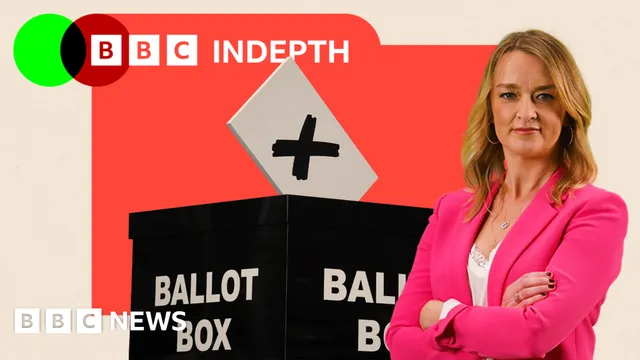
Nigel Farage targets Conservatives to lead Britain's right wing
2025-05-03 16:06- Nigel Farage intends to displace the Conservatives as the main right-wing party in Britain.
- Reform party's electoral support has surged, putting it in a competitive position with Labour and Conservative.
- The outcome of these elections could significantly alter the political landscape in the UK.
Express your sentiment!
Insights
In Scunthorpe, England, Nigel Farage expressed his ambitions for success in the upcoming local elections. He seeks to replace the Conservative Party as the dominant force on the right and to challenge the Labour Party for authority. Reform, the party he leads, has gained significant traction, threatening to surpass both Labour and Conservative support based on recent polling. While Reform managed about 14% of the vote in the previous national election, recent indications show the party's popularity is swelling as it incorporates themes like strong border control and curbing immigration, along with policies reminiscent of U.S. President Donald Trump’s administration. The political climate leading up to the local elections has been tumultuous, with increased challenges faced by the working class, amplified by rising food costs and economic decline in areas like Scunthorpe, historically reliant on its steel plant. Farage’s appeal to the working-class voters who once aligned with Labour bolsters his party's momentum, and he promotes a radical agenda to reform local governance. This includes ambitious plans like “a DOGE for every county,” inspired by efficiencies seen in agency spending in the U.S. This message resonates particularly with audiences frustrated by escalating costs and declining job security. Farage’s prominence as a British politician is underscored by his level of recognition and ongoing security needs, stemming from past incidents of violence during campaigns. His divisiveness plays a crucial role as well, with aggressive stances on immigration and contentious claims regarding crime. Despite this, there remains a core group of supporters, including voters who believe mainstream politicians neglect their concerns. The political landscape may see significant changes depending on the outcomes of the local elections. Farage’s strategies may force the Conservative and Labour Party to rethink their positions on immigration and related issues, potentially leading them to adopt “Reform-lite” policies in an effort to cater to the evolving right-wing electorate. Observers note that this could be detrimental, especially if voters prefer the more straightforward approach Reform offers. The stakes for both major parties are increasingly high, as any perceived weakness against a resurgent Reform Party could jeopardize their longstanding dominance in British politics.
Contexts
Local elections in the United Kingdom play a significant role in shaping the political landscape, offering insights into public sentiment and acting as a barometer for larger national trends. These elections often serve as a litmus test for the governing parties, providing an opportunity for voters to express their satisfaction or dissatisfaction with the overall management of local and national issues. As communities engage in the local electoral process, the outcomes can influence party dynamics, alter the balance of power within regional councils, and impact policy decisions that resonate beyond local borders. Political parties invest considerable resources in these elections, recognizing their potential to either bolster or weaken their positions ahead of general elections. The results of local elections often illuminate the prevailing political conditions, including issues such as economic performance, public services, and social dynamics. For instance, in certain regions, a surge in support for independent candidates or smaller parties may indicate discontent with major party policies or a desire for change. This shift can prompt broader strategic reconsiderations within larger parties, as failures in local contexts can signal potential weaknesses on a national scale. Conversely, a dominant performance from a ruling party can reinforce its legitimacy and provide momentum heading into upcoming general elections, as evidenced by historical correlations between local election victories and subsequent general election success. Moreover, local elections frequently have a direct impact on the policy priorities of elected officials. Newly elected councils can shift the focus on local services, infrastructure projects, and community engagement based on their electoral mandates. This responsiveness to voter concerns becomes crucial as policymakers must navigate the complex interplay between local responsibilities and national party agendas. Additionally, the outcomes can affect regional funding allocations and governmental support for local initiatives, further entrenching the significance of these elections in the political narrative. In the broader context of UK politics, local elections are not merely administrative exercises but crucial events that lay the groundwork for national political discourse. As the political parties recalibrate their strategies based on local electoral outcomes, these elections can also ignite grassroots movements and influence political activism at various levels. Therefore, understanding the implications of local elections extends beyond their immediate outcomes; it encompasses their capacity to shape political identities, inform future policies, and ultimately influence the trajectory of national politics.